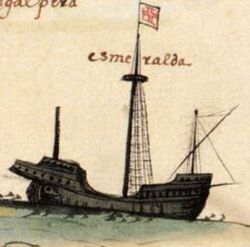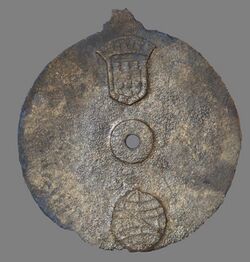Esmeralda (carrack)
Topic: Engineering
 From HandWiki - Reading time: 2 min
From HandWiki - Reading time: 2 min

Esmeralda was a Portuguese carrack (Portuguese: nau) that sank in May 1503 off the coast of Oman as part of Vasco da Gama's 1502 Armada to India while commanded by da Gama's maternal uncle Vicente Sodré. First relocated in 1998 and excavated by David Mearns in 2013–15, is the earliest ship found, as of 2016[update], from Europe’s Age of Discovery.[2][1][3]

Items recovered from the wreck site include the earliest known mariner's astrolabe believed to have been made between 1496 and 1501 and a ship's bell dated 1498.[4][5]
See also
- 4th Portuguese India Armada
References
- ↑ 1.0 1.1 Mearns, David L.; Parham, David; Frohlich, Bruno (2016-03-14). "A Portuguese East Indiaman from the 1502–1503 Fleet of Vasco da Gama off Al Hallaniyah Island, Oman: an interim report". International Journal of Nautical Archaeology 46 (2): 331–350. doi:10.1111/1095-9270.12175. http://eprints.bournemouth.ac.uk/23370/13/Mearns_et_al-2016-International_Journal_of_Nautical_Archaeology-1.pdf.
- ↑ Addley, Esther (2016-03-15). "Marine archaeologists discover rare artefacts at 1503 shipwreck site". The Guardian. London. https://www.theguardian.com/science/2016/mar/15/marine-archaeologists-discover-rare-artefacts-at-1503-shipwreck-site. Retrieved 2017-10-24.
- ↑ "History, Vasco da Gama's 1502-1503 Armada to India: Discovery of Esmeralda Shipwreck in Oman". http://esmeraldashipwreck.com/history/. Retrieved 2017-10-24.
- ↑ Morelle, Rebecca (2017-10-24). "Astrolabe: Shipwreck find 'earliest navigation tool'". BBC News. https://www.bbc.co.uk/news/science-environment-41724022. Retrieved 2017-10-24.
- ↑ Mearns, David L.; Warnett, Jason M.; Williams, Mark A. (2019-03-16). "An Early Portuguese Mariner's Astrolabe from the Sodré Wreck-Site, Al Hallaniyah, Oman". International Journal of Nautical Archaeology 48 (2): 495–506. doi:10.1111/1095-9270.12353.
 |
Licensed under CC BY-SA 3.0 | Source: https://handwiki.org/wiki/Engineering:Esmeralda_(carrack)13 views | ↧ Download this article as ZWI file
 KSF
KSF